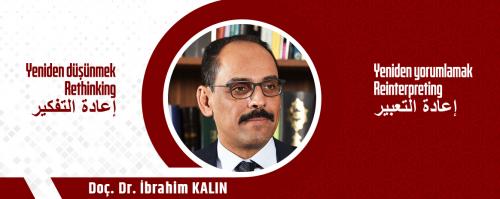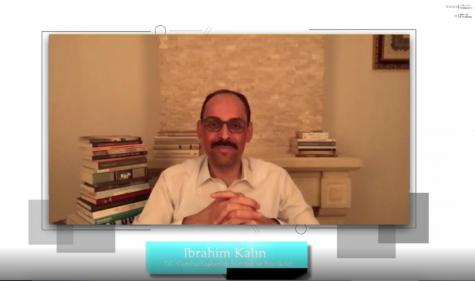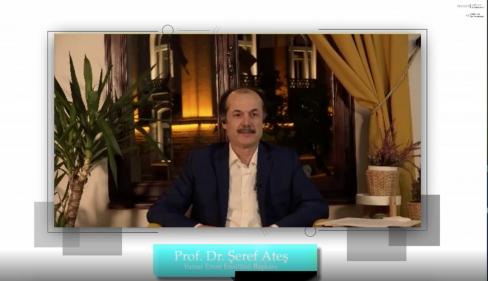Presidential Spokesperson İbrahim Kalın hosted at 'Rethinking, Reinterpreting'
Yunus Emre Institute President Prof. Dr. Şeref Ateş hosted Presidential Spokesperson İbrahim Kalın at his program "Rethinking, Reinterpreting," aired on the social media accounts of Yunus Emre Institute.
At the beginning of the program, Yunus Emre Institute President Prof. Dr. Şeref Ateş made comments. "We have come to realize, especially during the current outbreak, that there are two fundamental concepts in Anatolia's wisdom. One of them it is fellowship. Here, the basic approach is to support the people with whom we live together in a way different from companionship and take the road together. The second one is the brotherhood, another important concept in Anatolia's wisdom," he said.
"What do you think of Turkey's recent approach during the outbreak in terms of fellowship and brotherhood?" was Institute President Prof. Dr. Şeref Ateş's first question. In response, Kalın indicated that Turkey has managed the process quite well thanks to the investment in the country's healthcare system, self-sacrificial work by healthcare professionals, leadership of our President Recep Tayyip Erdoğan and adoption of measures by citizens. He noted that even the countries with larger economies and stronger scientific, industrial, and technological infrastructures were faced with tremendous challenges during the outbreak. Kalın pointed out that the number of daily tests conducted in Turkey neared 40,000, which is huge achievement.
"Various countries around the world are conducting tests according to their capabilities. Yet, what is tested on a daily basis is not our bodies, the virus, or bacteria in our bodies, but our souls, conscience and ethical values. This process has revealed that the immune system of the global system is actually very vulnerable. The outbreak has essentially put the world system under lockdown for several months. We have seen once again that the global system is rife with great defects," he said. He noted that this was what our President meant when he said, "The world is bigger than the five." Pointing out that everyone is entitled to benefit from the riches, science, medicine, technology and resources of the world in a fair and equal manner, Kalın maintained that it was important to remember these values again. "Our principle is that let humanity live to let people live. When we send aid to the people in need and other countries, we see how the list of priorities is shaped. We are going through a time in which humanitarian and conscientious feelings are tested," he said.
Recalling that Turkey has sent medical supplies to many countries including Palestine, Somalia, Italy, Spain, and the US, some in the form of grants, others as purchases, Kalın said:
"In this period, I believe that this has exalted our human qualities, giving them more essence. There were some occasional criticisms, though. 'Why do we send aid abroad when we need it?' Turkey, especially our President, has always been cautious in such matters. We first address the needs of our own citizens before sending aid to the people in need. This is because our guiding principle is 'Let humanity live to let people live'. The life-saving materials, needed by people, should be shared. This is particularly so in this period. This is because when we help the needy, we actually help ourselves, not the other people. Whatever we give adds something to us. It makes us more 'us', making us grow and expanding that circle. In other words, it increases the number of friends and companions. What makes the road easy, meaningful, cheerful, and enjoyable is the journey on which we embark with our fellows."
Institute President Prof. Dr. Şeref Ateş asked: "Our folk songs have a special place in our life. More importantly than this, they have strong ties with truth as they have produced with testimony to real-life experiences and based on the social or personal life. This makes folk songs an important source of data for understanding the identity and spirit of human beings and their relationship to the world. Do you think does music produced in different geographies offer a more authentic path to understand human beings, know them better, and learn about their world of meanings? Can this be a means for understanding and communication with people?" In response, Kalın said: "Our folk songs are great works that mirror our human values. They are about sorrow, cheer, affection, compassion, friendship, love, and wisdom. They constitute a huge domain. They are the works in which the centuries old culture of Anatolian people, their relationship with time and space, and their toil for acquiring true human qualities have been expressed in lyrics and composition in the most refined manner. Seeing them as mere folkloric cultural elements would be unfair. When we go deeper, we realize that the presentation of the meaning we find there with an aesthetic background actually mirrors our being human. In this regard, if we want to penetrate a culture or spiritual of a community, we need to pay heed to its folk songs. It is not possible to gather that profundity by looking at from a distance or making superficial assessments.
Institute President Prof. Dr. Şeref Ateş stated that in many of his works, Kalın argued that the Western way of thinking stipulated that the world should be interpreted primarily based on the data given and that it should be disintegrated into its parts and reproduce it through science in a pragmatic manner. "You say that the modern Western philosophy treats both man and the university mechanically, and therefore, it disintegrates it into its parts. You further argue that they adopt the most pragmatic criteria in management and the nations that can adapt to this well can make progress and those who fail to adapt to it become backward, and even if the communities in the rest of the world raise objections to this system due to cultural differences, they can find themselves a place in the development indices only using the production methods and mechanism developed by the West, and it does not matter if these countries that do this belong to the Islamic, Hindu or Buddhist culture. In this case, does what we refer to as culture consist of merely local folklore, history, architecture and touristic sites or the map of consciousness that forms the very basis of all of them?" he asked. In response, İbrahim Kalın explained that the problem of analytic thought is important as it is presented as the most distinctive elements of modern thought. He noted that to analyze something is to divide it into its parts, and determine its architecture or mechanism to its smallest fundamental components. Kalın stated that modern natural sciences are very successful in doing this.
"Many inventions and discoveries that have made life easier have been made thanks to this. It still occupies a significant proportion of our life. It is not limited to natural sciences or technological or industrial products, but it is frequently employed in politics or international relations as well. It has some merits, but we have to realize that no analysis that fails to come up with a synthesis is deficient. If it fails to take us back to a synthesis or assemble back the components after disassembling them, such a thought is doomed to be defective. After analyzing the tiniest squares or pixels of a photograph and its textures and materials, we have to have an idea about what it looks like in its entirety in order to see the whole picture. Without a synthesis, analysis leaves us among the parts and we will be lost there. We have to get back to a synthesis," he said. İbrahim Kalın added:
"Only such a perspective of synthesis will allow us to penetrate into a subject or analyze it and make sense of it in depth. Intellectual shallowness and cultural mediocrity have rendered such in-depth processes of analysis and synthesis dysfunctional. Currently, only those works that will be completed swiftly or produced in a couple of days are accepted. Even in this age of momentary production and consumption in which we are bombarded with unbelievable gusts of news and information, the fleeting fame, short-lived rises to popularity have come to be perceived as precious. However, without in-depth thought, we cannot embark on a journey and make progress on our journey and stick to our path."
Kalın asserted that the analytic thought and the Cartesian though in particular had been considerably influential on the Western thought and mathematics, physics, and their merits are still acknowledged. "However, we have to realize that a system of thought which is solely based on analysis cannot take us to goodness, truth, and beauty. What are the dominant values of this age? They are such values as benefit, profit, efficiency, figures, quantitative growth, and economic development. They are all products of thought, in which analytic thought is intertwined with pragmatism. We have come to forget that there are also basic values such as good, right, beautiful, human beings, conscience and morality as well as assets or products that are associated with them such as art, reason, and culture, and they are meaningful as they are. Pragmatism constitutes a major metaphysical deviation as it reduces the meaning of beings to their beneficial value. Today, we are all engaged in this practice. Even if we say that this is not the case, the very practice in which we live urges us to do this," he said.
İbrahim Kalın also talked about the history of the concept of culture and cultural colonialism. "Today, we see that culture has become more virtual, elastic, plastic, and superficial. We are now faced with the masses who are trying to arrange their lives based on a screen ontology. New generations believe that looking at a screen, an iPad, or a smartphone is the primary or most important modality of reality. This, in turn, undermines largely the cultural, authentic, and real structure that touches on time and space, soil and air and water. Culture becomes a commodity that is produced and consumed. Today, what is marketed as culture, such as cinema or music, via Hollywood or marketing is actually a good, or product produced in an extremely artificial manner and consumed for profit," he said.
Then, Institute President Prof. Dr. Şeref Ateş asked: "You say that Occidentalism is as dangerous as Orientalism. How can we avoid the both traps?" In his answer, Presidential Spokesperson İbrahim Kalın noted that both concepts are actually two traps that complement each other.
Stressing that European academics had developed the concept of Orientalism in order to understand and control Eastern communities, Kalın stated that Orientalism methodologically told these communities that their own cultures, languages, and histories had no value. Kalın explained that it instilled in the minds of Eastern communities the notion that these values must be replaced with Western ones, and gave the Indian and Greek mythologies as an example.
He pointed out that in Orientalism, the Indian mythology is perceived as mystical, enigmatic, irrational, and non-rational, whereas the Greek mythology can be treated as scientific and rational. "The Orientalist mindset is still alive in our mental codes.
The alternative to Orientalism should not be Occidentalism. When we sum up all methodological and mental mistakes made by Orientalists and apply them to the West, we are faced with another set of mistakes. Two wrongs do not make a right. In other words, if we say, 'They have perceived us as such for 200 years and portrayed us more oriental, mystical, or lowly, and let us do the same to Western societies,' then, we are on the brink of a huge error. This is because if we argue that the Orientalist perspective is defective, we cannot do the same to Western communities. We must first understand ourselves, analyze the West with a different perspective and in depth, and penetrate into its meaning. Instead of uttering with generally accepted judgments or arguments with a sort of intellectual lethargy, we have to try to penetrate into the depths of the Western society, history, thought, metaphysics, scientific and ideological history," he said.
Institute President Prof. Dr. Şeref Ateş had another question: "Human beings seek to control everything. They want to own everything as if they were their property. With this drive to control, the mechanisms of monitoring, CCTVs, etc., become part of our lives. How do you see these developments in terms of their effects on human nature and behaviors, not solely from the Big-Brother-watches-us perspective?" In response, İbrahim Kalın mentioned that human beings have strong urges to control everything, own everything, and turn them into commodities.
He noted that the urge to control everything in order to take them under command is alienating people to themselves. "The very mechanisms we have produced have started to control us. When we look at institutions, organizations, finance, marketplace, markets, stock exchanges, balances and security problems, etc., as a whole, we see that this structure has started to control human beings although it is supposed to make life easier for human beings," he said.
Kalın maintained that human beings' alienation to the works they have created would have destructive consequences and gave Mary Shelley's 'Frankenstein'. Reminding that in this novel, a creature created by a man eventually destroyed his creator, Kalın stressed that the main problem is the lack of affection.
"If we turn the objects into machines, commodities, or tools instead of something which we love or to which we are accustomed, we are alienated to nature and vice versa. The urge to control inside us make us go out of control and put us into the control of other things. There is a major distinction between owning something and staking a claim on it; it is a delicate distinction. To try to own something or make it your own property is a reflection of the drive to control. To stake a claim on in it, on the other hand, is to protect it. It is to stake a claim on it without dominating over it or trying to make it your own property. A mother's looking after her child or a person's protecting his/her beloved or friend can be given as an example. To stake a claim without trying to own... We need to ensure that this distinction should be remembered once again," he said.
İbrahim Kalın indicated that humanity is today facing a crisis at a scale never seen before as the gap between the rich and the poor has widened and the technological gadgets that are supposed to make life easier are being used as weaponry of mass destruction, causing much bloodshed.
He asserted that this should not lead people to pessimism or jaundice as there will always be a way out and the good will beat the evil.
Noting that he has also witnessed that the evil may go unpunished, Kalın argued that many good things happen amid all this destruction, and the good continue to live, and we can see the good things that touch on our minds, feelings and consciences, and we will being by multiplying them, and we will be the voice of the oppressed and victimized people, and we will look after them and when we look after them, we will look after ourselves and our human qualities, and we are not giving anything to anyone, but doing favor to ourselves, and the favor we do is actually the favor done to ourselves, and he believes that when we multiply them, then all superficiality and evil tendencies will be overcome and he is not pessimistic in that regard.
Institute President Prof. Dr. Şeref Ateş's last question was: "Human beings always seek to be in Paradise. Why are we after a paradise? What kind of paradise are we after? What do we want it? If all your wishes came true, what would be your three wishes?" In his answer, Presidential Spokesperson İbrahim Kalın noted that he finds it hard to answer such questions. Kalın indicated that his list would start with books and musical instruments and soon become too long. "Therefore, instead, I wish that God make it possible for us all to do things so that good, right and beautiful things dominate our lives," he said.
For programme;
https://www.pscp.tv/w/1RDxlQgDXqOKL (Turkish)
https://www.pscp.tv/w/1djGXQPzylBJZ?t=20 (English)
https://www.facebook.com/yeearabic/videos/830361697474252/ (Arabic)








